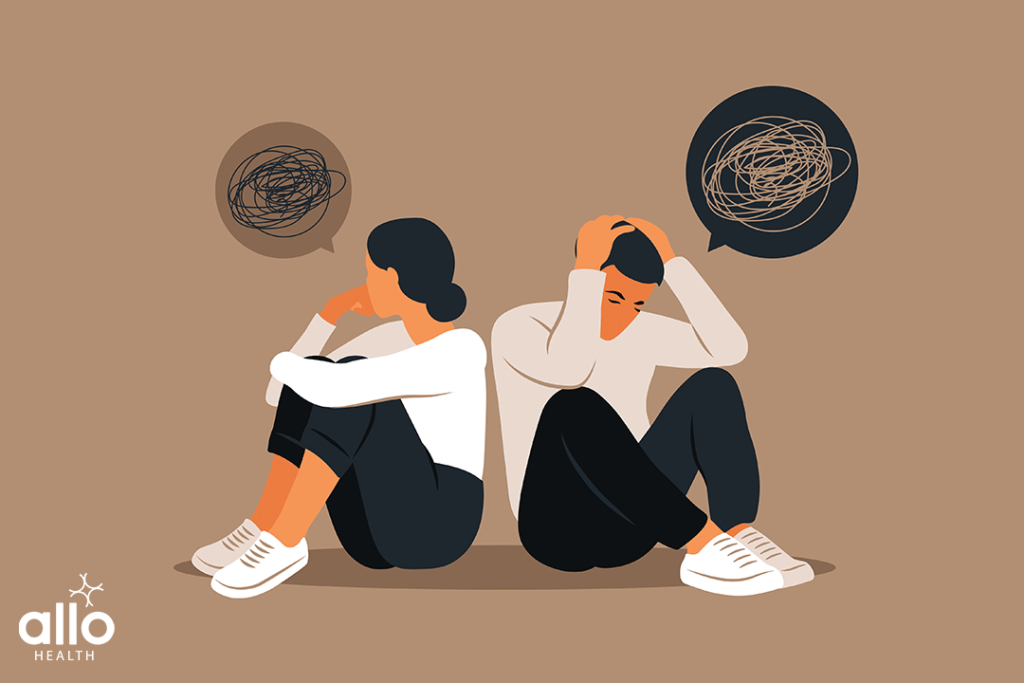Myths & Facts: Low Sexual Desire

Allo Health is dedicated to personalized well-being, offering support and trusted information tailored to individual health goals. The platform emphasizes human-generated content, led by a distinguished medical team of experts, including physicians and sexual health specialists. Their commitment to credibility involves rigorous fact-checking, authoritative research, and continuous updates to ensure accurate, up-to-date information. Allo Health's unique approach goes beyond conventional platforms, providing expert-led insights and a continuous commitment to excellence, with user feedback playing a crucial role in shaping the platform's authoritative voice.

Dr Dodda Basavaraj did his MBBS from Vijayanagara Institute Of Medical Sciences, Ballari . His domain of interest always lied in obstetrics , gynaecology and sexual health. He has worked as Medical officer, Tele-consultation doctor at tertiary and primary health care sectors in Karnataka . He believes strongly in medical practice which is evidence based, non-judgemental and patient centric.
Why This Was Upated?
Our experts continually monitor the health and wellness space, and we update our articles when new information became available.
Updated on 15 June, 2024
- Article was updated as part of our commitment to diversity, equity, and inclusion.

"The following blog article provides general information and insights on various topics. However, it is important to note that the information presented is not intended as professional advice in any specific field or area. The content of this blog is for general educational and informational purposes only.
Book consultation
The content should not be interpreted as endorsement, recommendation, or guarantee of any product, service, or information mentioned. Readers are solely responsible for the decisions and actions they take based on the information provided in this blog. It is essential to exercise individual judgment, critical thinking, and personal responsibility when applying or implementing any information or suggestions discussed in the blog."
What is Low Sexual Desire?
Low sexual desire, also known as hypoactive sexual desire disorder (HSDD), is a condition characterized by a lack of interest in sexual activity. This can include a lack of desire for sexual activity, a lack of sexual fantasies, and a lack of sexual arousal. It is important to note that low sexual desire is not the same as erectile dysfunction or difficulty achieving orgasm.
One of the most common causes of low sexual desire [Hyperlink LSD HB] in women is hormonal changes that occur during menopause. As women age, their levels of estrogen and testosterone decrease, which can lead to a lack of interest in sexual activity. Hormonal imbalances can also be caused by certain medical conditions, such as thyroid disorders or polycystic ovary syndrome (PCOS).
In men, low sexual desire can be caused by a variety of factors, including hormonal imbalances including low testosterone levels, and certain medical conditions such as diabetes or heart disease. Psychological factors, such as stress, depression, and relationship concerns can also contribute to low sexual desire in men.
Low sexual desire or low sex drive can also be caused by certain medications, such as antidepressants and blood pressure medications.
Treatment options for low sexual desire vary depending on the underlying cause of the condition. Hormonal imbalances can be treated with hormone replacement therapy (HRT), while psychological factors can be addressed through therapy or counseling. In some cases, a combination of treatments may be needed.
Speak with a healthcare provider if you are experiencing low sexual desire. They can help determine the underlying cause of the condition and develop an appropriate treatment plan. It is also important to communicate with your partner about your feelings and concerns.
Why Is Sexual Desire Needed For Satisfying Sex?
The desire for sex is a crucial component of sexual activity. It is the driving force behind sexual attraction and the motivation to engage in sexual behaviors. Without sexual desire, the act of sex would be nothing more than a physical act, lacking the emotional and psychological components that make it pleasurable and satisfying.
There are several reasons why sexual desire is required to satisfy sex.
Sexual desire is necessary for arousal
Arousal is the physiological response that occurs in the body when a person is sexually stimulated. This response includes physical changes such as increased blood flow to the genital area, which makes the genitals more sensitive to touch and more receptive to sexual activity. Without sexual desire, the body would not respond in this way and sexual activity would not be enjoyable.
Sexual desire is necessary for emotional and psychological satisfaction
Sexual activity is not just a physical act, but also an emotional and psychological experience. The emotional and psychological aspects of sex are closely tied to sexual desire. For example, feeling desired by a partner can increase self-esteem and confidence, which can enhance the overall sexual experience.
Sexual desire is necessary for intimacy
Intimacy is the emotional and psychological connection that people feel with their partner during sexual activity. The desire for sex is essential for the development and maintenance of intimacy between partners. Without sexual desire, there would be no emotional or psychological connection between partners and the sexual experience would be lacking in intimacy.
Myths About Low Sexual Desire
Low sexual desire is a very common occurrence among both males and females – it can be affected by both subjective and objective causes. Just like with many common sexual disorders, many myths and misconceptions surround the topic of low sexual desire – we’re here to bust a few!
Myth: Low sexual desire is only a concern for women.
Fact: In reality, both men and women can experience low sexual desire. This issue can be caused by a variety of factors, including hormonal imbalances, stress, and relationship concerns.
Myth: Low sexual desire is a sign of a failing relationship.
Fact: Low sexual desire does not necessarily indicate a failing relationship. It can be caused by a variety of factors, including stress, fatigue, and depression. If a couple is experiencing low sexual desire, it is important to have an open and honest conversation to address the issue and find ways to improve the situation.
Myth: Low sexual desire is a sign of aging.
Fact: While aging can contribute to a decline in sexual desire, it is not the only cause. Many individuals continue to have a healthy sex life well into their golden years.
Myth: Low sexual desire is a medical condition that can only be treated with medication.
Fact: While medication can be an effective treatment option for some individuals, there are many other ways to address low sexual desire. This can include counseling, lifestyle changes, and relationship therapy.
Myth: Low Sexual Desire isn’t treatable.
Fact: Experts in the field of sexual medicine, through holistic therapy, can provide relief of Low Sexual Desire or low sex drives. The professionals first determine the cause behind their patient’s low sexual desire – they then target the cause and focus on both mind and body to help increase libido. Treatment for Low Sexual Desire includes hormone replacement therapy, treating any medical, mental health or sexual health conditions, changing medications that are causing side effects, and improving mental health and lifestyle habits.
Myth: Low Sexual Desire means a lack of physical attraction.
Fact: Low sexual desire does not equate to lack of attraction. There are various causes behind low sexual desire or low libido such as mental health conditions such as anxiety, and depression, medical conditions such as arthritis and diabetes, sexual dysfunctions such as Performance Anxiety, Erectile Dysfunction, and Premature Ejaculation, hormonal imbalances such as low testosterone and estrogen, and medication side effects from classes of meds such as antidepressants (SSRIs & SNRIs), antipsychotics and beta-blockers.
Myth: Low sexual desire has nothing to do with psychological health.
Fact: There are various causes – both physical and psychological – that can affect sexual desire or libido. Some include mental health conditions such as anxiety and depression, increased stress, insecurities, and low-self esteem, physical/sexual abuse, hormonal conditions, medication side effects, etc.
Myth: Hormonal fluctuations do not affect sexual health.
Fact: Women experience hormone fluctuations as they age and when estrogen levels drop very low (commonly during the 40s and 50s), they go through menopause. The low levels of estrogen can lead to a negative impact on sexual wellness – for example, it can lead to low libido, vaginal dryness, or lack of lubrication leading to painful sex and disrupted mood and sleep patterns
Myth: Low sexual desire means that you don’t understand much about sex
Fact: Low sexual desire is a common issue among many individuals, and it is often assumed that a lack of interest in sex means that a person does not understand or know much about the act. However, this assumption is a myth.
Sexual desire is a complex topic that is influenced by a variety of factors, including physical, emotional, and psychological elements. The level of sexual desire can change due to changes in hormones, medications, or other health conditions, as well as stress, relationship concerns, and other life circumstances. Sexual desire is not a constant, and it can fluctuate throughout a person’s life. Some people may have a high level of sexual desire at certain times, while others may have a low level at other times.
Myth: Low sexual desire reduces intimacy in intimate relationships
Fact: Low sexual desire can have a significant impact on intimacy in a relationship. While it is a common belief that a lack of sexual desire equals a lack of intimacy, this is not necessarily the case.
Intimacy is defined as a close emotional connection between two people. It can be expressed through physical touch, emotional openness, and shared experiences. Sexual desire is just one aspect of intimacy, and it is possible to have intimacy without sexual desire.
Myth: Low sexual desire isn’t caused by medical conditions
Fact: Low sexual desire can be caused by various medical conditions, including hormonal imbalances, depression, anxiety, and certain medications.
Hormonal imbalances, such as low levels of testosterone, can cause a decrease in sexual desire. This is particularly common in menopausal women, as their hormone levels fluctuate during this time. In addition, depression and anxiety can also affect sexual desire. These mental health conditions can cause a lack of interest in sexual activity, as well as a decrease in sexual function.
Certain medications can also cause low sexual desire. For example, certain antidepressants, blood pressure medications, and birth control pills can all affect sexual desire. These medications can cause a decrease in libido, as well as other sexual side effects such as difficulty reaching orgasm or erectile dysfunction.
Myth: Low sexual desire isn’t caused by sexual abuse or abusive relationships
Fact: Sexual abuse can have a significant impact on a person’s sexual health and wellbeing. One common myth is that sexual abuse does not cause low sexual desire, but this is not true.
Survivors of sexual abuse often experience a range of physical and emotional symptoms, including low sexual desire. This can be caused by the trauma of the abuse, which can lead to feelings of fear, shame, and guilt. These feelings can make it difficult for a survivor to engage in sexual activity or to feel comfortable with their own sexuality.
In addition to the emotional impact, sexual abuse can also lead to physical symptoms such as pain during sex, difficulty with arousal, and difficulty reaching orgasm. These physical symptoms can further contribute to low sexual desire.
Everyone responds differently to sexual abuse, and the effects can vary depending on the individual and the severity of the abuse. Some survivors may experience low sexual desire for a short period of time, while others may struggle with it for years. Healing from sexual abuse is a process, and it can take time. Seeking professional help, such as counseling, therapy, or support groups, can be an essential step in the healing process.
Myth: Hormone replacement therapy (HRT) will automatically increase sexual desire.
Fact: Hormone replacement therapy (HRT) is a treatment option for women experiencing symptoms of menopause such as hot flashes, night sweats, and vaginal dryness. However, one myth surrounding HRT is that it will automatically increase a woman’s sexual desire.
While HRT can help alleviate symptoms that can negatively impact sexual function, such as vaginal dryness, it does not necessarily lead to an increase in sexual desire. Each woman’s experience with HRT is unique and may vary depending on the type of HRT they are using and their individual hormonal levels.
Myth: Testosterone is the only hormone that affects sexual desire in women.
Fact: Testosterone is often associated with sexual desire in men, but it also plays a role in women’s sexuality. However, it is not the only hormone that affects sexual desire in women.
Testosterone is a steroid hormone that is produced in the ovaries and adrenal glands in women, and in the testes in men. It is responsible for the development of secondary sexual characteristics, such as body hair and muscle mass, and also plays a role in libido.
However, other hormones also play a role in sexual desire in women. These include estrogen, progesterone, and dopamine.
- Estrogen, which is produced in the ovaries, is responsible for the development of secondary sexual characteristics such as breast development and the regulation of the menstrual cycle. It also plays a role in sexual desire by increasing blood flow to the genitals and promoting lubrication.
- Progesterone, which is also produced in the ovaries, is responsible for preparing the uterus for pregnancy and also plays a role in libido by promoting relaxation and reducing stress.
- Dopamine, a neurotransmitter, is responsible for regulating mood, motivation, and pleasure. Low levels of dopamine can lead to decreased sexual desire.
Myth: Menopause automatically causes a decrease in sexual desire.
Fact: Menopause is a natural process that marks the end of a woman’s reproductive years. It is often accompanied by a variety of physical and emotional symptoms, including hot flashes, night sweats, and mood swings. However, one myth that persists about menopause is that it automatically causes a decrease in sexual desire.
The truth is that menopause does not automatically lead to a loss of sexual desire. In fact, many women continue to enjoy a healthy sex life after menopause. Studies have shown that the level of sexual desire during menopause varies greatly among women, with some experiencing a decrease and others reporting no change at all.
There are a number of factors that can affect sexual desire during menopause. Hormonal changes that occur during menopause can lead to vaginal dryness, which can make intercourse uncomfortable or painful. This can make it difficult for some women to maintain a healthy sex drive.
Myth: Low estrogen levels always cause low sexual desire.
Fact: Low estrogen levels can cause a variety of symptoms, including hot flashes, night sweats, and vaginal dryness. However, it is a myth that low estrogen levels always cause low sexual desire.
Sexual desire is a complex phenomenon that is influenced by a variety of factors, including hormonal levels, emotional well-being, and relationship dynamics. While low estrogen levels can certainly have an impact on sexual desire, there are many other factors that can also play a role.
Myth: Hormone therapy is the only solution for low sexual desire.
Fact: Hormone therapy is often touted as the go-to solution for low sexual desire, but is it the only option available?
The short answer is no. While hormone therapy can be effective in treating low sexual desire, it is not the only solution. In fact, there are a variety of treatment options available for those experiencing low sexual desire.
Hormone therapy, also known as hormone replacement therapy, involves taking medication to supplement or replace hormones in the body. It is often used to treat symptoms of menopause, such as hot flashes and low sexual desire. However, hormone therapy can come with a range of potential side effects, including weight gain, headaches, and an increased risk of certain types of cancer.
Other treatment options for low sexual desire include:
- Behavioral therapy: This form of therapy can help individuals identify and address psychological factors that may be contributing to low sexual desire.
- Medication: Certain medications, such as antidepressants and blood pressure drugs, can cause low sexual desire as a side effect. Changing or adjusting medication may help to improve sexual desire.
- Lifestyle changes: Simple lifestyle changes, such as getting regular exercise and getting enough sleep, can help to improve sexual desire.
- Relationship counseling: Relationship concerns can also contribute to low sexual desire. Counseling can help individuals address these concern and improve their sexual relationships.
Myth: Low sexual desire is a normal part of aging.
Fact: Low sexual desire is a common concern among older adults, but it is not necessarily a normal part of aging. Many factors can contribute to decreased sexual desire as we age, including physical changes, emotional concerns, and medication side effects. However, with the right approach, it is possible to maintain a satisfying sex life as we get older.
One of the biggest physical changes that can affect sexual desire as we age is decreased hormone levels. Testosterone, in particular, plays a crucial role in maintaining sexual desire in both men and women. As we age, our bodies produce less testosterone, which can lead to decreased sexual desire. Hormone replacement therapy (HRT) can help to increase testosterone levels and improve sexual desire in older adults.
Emotional concerns can also contribute to decreased sexual desire as we age. Stress, anxiety, and depression can all affect sexual desire and function. Older adults may also experience emotional changes such as grief, loneliness, or relationship concerns that can affect sexual desire. In these cases, therapy or counseling can help to address the underlying emotional concerns and improve sexual desire.
Wanting satisfying sexual pleasure is a normal part of life and is nothing to be embarrassed about – in fact, a reduced sex drive could be an indicator of an underlying concern. Reduced sexual drive can be different for person-to-person, and should you experience symptoms of the condition, we encourage you to reach out for professional help. Sexual health experts or health care providers will be able to first diagnose the cause behind your low sexual desire concerns, before considering an appropriate treatment plan for you. It’s not advised that you follow treatments suggested from inaccurate sources, and instead plan your recovery with your doctor together.






































